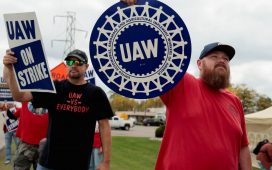A deal between Fiat Chrysler Automobiles and Unifor remained elusive early Wednesday as the 11:59 p.m. ET strike deadline nears, Unifor President Jerry Dias said.
“We’ve got a long ways to go between now and midnight,” Dias told Automotive News Canada.
Negotiations between the two parties, which impact about 8,400 workers in Canada, continued on Wednesday in Toronto. The union has aimed to secure a new product for FCA’s Windsor, Ont., assembly plant and is looking to pattern a new contract with the company off of the one it recently secured with Ford Motor Co., among other goals.
“We’re still arguing with the pattern and there’s a lot of other issues we need to get our hands around. We’ve got major issues in some of the locations that we need to tidy up,” said Dias, who declined to offer specifics.
Should the two sides fail to reach an agreement by the strike deadline, unionized FCA workers in Canada could begin striking.
A strike would halt production of the Chrysler Pacifica, Voyager and Grand Caravan minivans in Windsor, as well as the Chrysler 300 sedan and Dodge Charger and Challenger muscle cars built in Brampton. Models built at those assembly plants accounted for about 16 percent of the company’s new-vehicle sales in Canada and the United States in the first three quarters of 2020, according to the Automotive News Data Center in Detroit.
A request for comment from an FCA Canada spokesperson was not immediately returned.
Unifor, like the UAW, engages in what is known as pattern bargaining, meaning it aims to base subsequent contracts with the Detroit automakers on the first one it agrees to in each round of talks. In this case, Unifor is looking to base contracts with FCA and, eventually, General Motors, off the Ford contract, which was ratified by workers on Sept. 28.
The Ford contract included raises and bonuses for hourly workers, a reduction in the wage grow-in period for new hires and a commitment from the automaker to invest $1.5 billion in its Oakville, Ont., plant to begin building EVs in 2026, among other provisions. Ford, meanwhile, gained what it called “competitive alternative work schedules” that it said would make its Canadian plants more efficient, as well as an “enhanced temporary employee program.”
According to the union, however, FCA has challenged Unifor on at least some aspects of the Ford pattern. In an update to members posted Tuesday on its website, Unifor said FCA has taken issue with “items relating to wages and lump sums, health care benefits and other matters.”
The union also wanted “firm commitments on facility investments and product allocations” from FCA, according to the update. Dias previously said the union was looking for at least one new product for the Windsor minivan plant, which ended its third shift earlier this year, resulting in about 1,500 workers losing their jobs. It also wants clarity for the future of the Brampton plant, which has long been the subject of speculation due to the aging platforms its muscle cars are built on.
Dias was scheduled to hold a news conference at 3 p.m. ET to provide an update on the negotiations, but at about 1:45 p.m. ET, the union cancelled the event. It’s now scheduled for 10 a.m. ET on Thursday.








